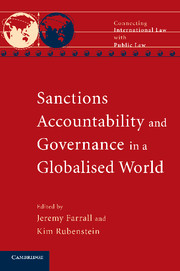Book contents
- Frontmatter
- Contents
- Contributors
- Series editors' preface
- Editors' preface
- Introduction: Filling or falling between the cracks? Law's potential
- PART I Setting down the foundations
- PART II Internationalising public law
- PART III Implementing Security Council sanctions
- PART IV The place of corporations
- PART V The role of lawyers
- PART VI Public law and public policy
- PART VII Parallel case studies
- 15 Discriminating for world peace
- 16 Removing barriers to protection at the exported border: Visas, carrier sanctions and international obligation
- Concluding remarks
- Bibliography
- Index
16 - Removing barriers to protection at the exported border: Visas, carrier sanctions and international obligation
Published online by Cambridge University Press: 05 October 2010
- Frontmatter
- Contents
- Contributors
- Series editors' preface
- Editors' preface
- Introduction: Filling or falling between the cracks? Law's potential
- PART I Setting down the foundations
- PART II Internationalising public law
- PART III Implementing Security Council sanctions
- PART IV The place of corporations
- PART V The role of lawyers
- PART VI Public law and public policy
- PART VII Parallel case studies
- 15 Discriminating for world peace
- 16 Removing barriers to protection at the exported border: Visas, carrier sanctions and international obligation
- Concluding remarks
- Bibliography
- Index
Summary
Introduction
Asylum is being gradually denuded of the national institutional mechanisms (judicial, legislative and administrative) that provide the framework for a fair and effective asylum hearing. In this sense, there is an ongoing ‘denationalization’ or ‘deformalization’ of the asylum process. This chapter critically examines one of the linchpins of this trend: the erection of pre-entry measures at ports of embarkation in order to prevent asylum seekers from physically accessing the territory of the state.
Pre-entry measures comprise the core requirement that foreigners possess an entry visa granting permission to enter the state of destination. Visa requirements are increasingly implemented by immigration officials posted abroad or by officials of transit countries pursuant to bilateral agreements (so-called ‘juxtaposed’ immigration controls). Private carriers, which are subject to sanctions if they bring persons to a country who do not have permission to enter, also engage in a form of de facto immigration control on behalf of states. These measures constitute a type of ‘externalized’ or ‘exported’ border that pushes the immigration boundaries of the state as far from its physical boundaries as possible.
Pre-entry measures have a crippling impact on the ability of asylum seekers to access the territory of states to claim asylum. In effect, states have ‘externalized’ asylum by replacing the legal obligation on states to protect refugees arriving at ports of entry with what are perceived to be no more than moral obligations towards asylum seekers arriving at the external border of the state.
- Type
- Chapter
- Information
- Sanctions, Accountability and Governance in a Globalised World , pp. 378 - 406Publisher: Cambridge University PressPrint publication year: 2009
- 1
- Cited by

